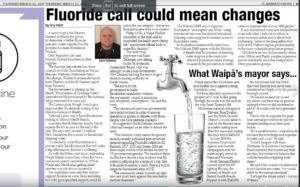A move to give the Director General of Health the power to determine whether fluoride goes into water supplies has the potential to create divisions in Waikato.
Only Hamilton City and Waikato District fluoridate all their supplies.
The fluoride free website lists those councils not fully fluoridating as Waipa, Hauraki, Waitomo, Matamata-Piako, Otorohanga, Thames-Coromandel (apart from Thames) and South Waikato (apart from Tokoroa).
The Government is picking up the Health (Fluoridation of Drinking Water) Amendment Bill introduced by the National led government five years ago.
The Labour plan, though, would give responsibility for decision making to the Director-General of Health.
National’s plan was to hand the decision making to District Health Boards.
Associate Health Minister Ayesha Verrall expects the bill to pass by the end of the year. She says only around 2.3 million New Zealanders have access to fluoridated drinking water.
“Community water fluoridation is a proven public health measure that will make a big difference to children’s wellbeing.”
As with the Maori ward issue confronting Waipa District councillors, when the News canvassed council candidates in 2019 in Waipa and ?torohanga getting direct answers was not always successful.
Ten candidates were said they did not support fluoride in water. Four, including two who gave qualified support, could be put in the yes category – but seven declined to give their own opinion.
Philip Coles, a Waipa District councillor, at the time said he supported the health sector being the “appropriate official body to make this decision”.
The most vocal opponent was Kane Titchener, now sitting on the Te Awamutu Community Board, who was unhappy to see Local Government New Zealand backing the move to give decision making authority to health boards.
“The move by the government to make fluoridation mandatory without the community’s input is draconian and completely unacceptable,” he said this week.
“The current and previous governments have failed to front in order to answer questions or appear in debates with those people who have genuine concerns.”
He suggested Health Minister Andrew Little had reneged on an offer to debate the issue.
“The concerns which cannot be ignored include recently published peer reviewed research regarding Fluoride’s effect on IQ. Bashash, 2017, 2018 and Green, 2019 are three major mother-child studies funded by US government agencies. The results of these studies have shown a loss of about four IQ points in offspring for a range of 1 mg/litre of fluoride in mother’s urine. This is a typical range for fluoridated areas of NZ.
“The community needs to stand up right now and push back against this mandatory medical treatment.”
The Waikato DHB says it supports fluoridation “at accepted safe levels” being introduced into non-fluoridated reticulated drinking water supplies to increase access to fluoridated water.
In its position statement the board says: “the Waikato DHB agrees with the Ministry of Health that fluoridation of drinking water supplies is the most cost-effective population-based strategy to assist in the prevention of dental caries in communities of over 1000 people.”
It says fluoridated water acts irrespectively of an individual’s behaviour, ethnic or socio-economic status and is effective in addressing “some of the inequalities that exist in the Waikato region, predominantly in the most vulnerable population groups”.
“Children from low socioeconomic status areas, Maori, and Pacific peoples experience poorer oral health outcomes compared to other population groups.

•Click here to read
